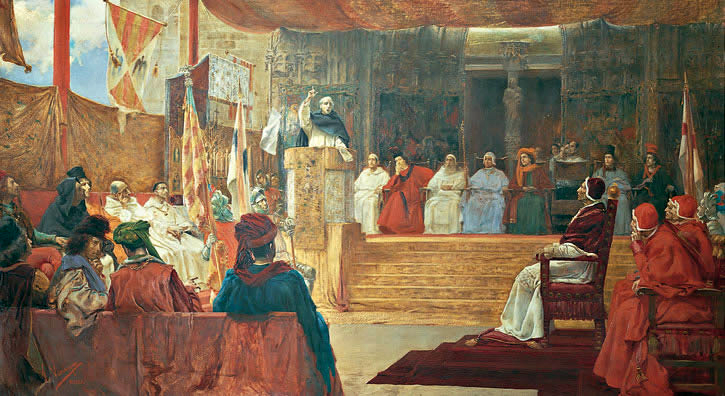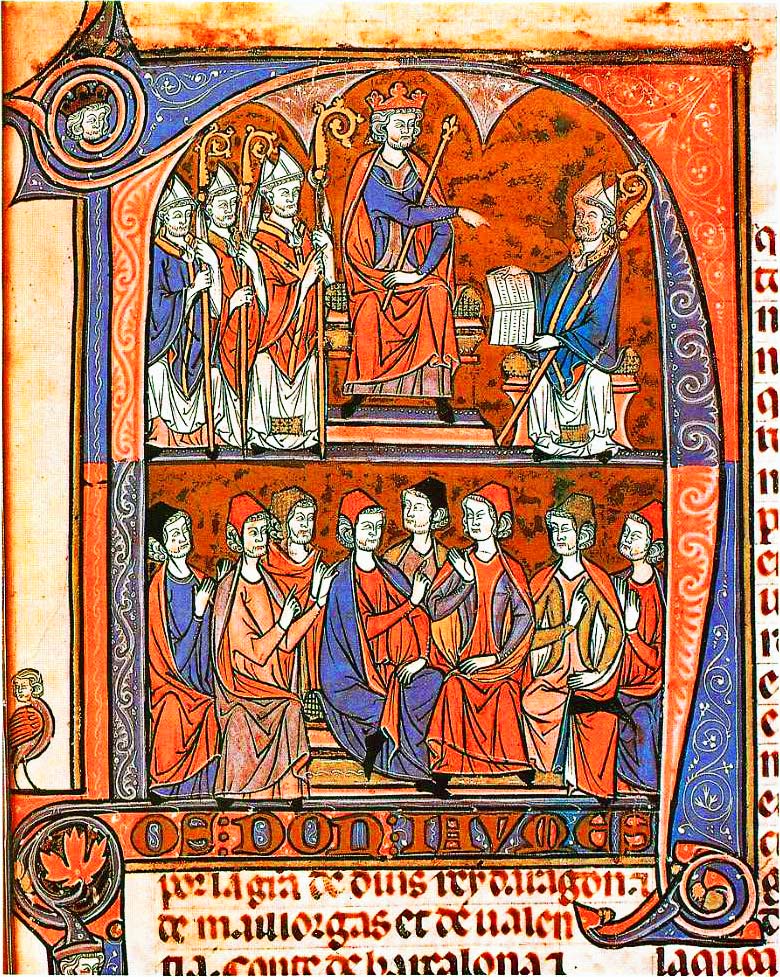|
Juan Ximénez Cerdán
Juan Ximénez (or Jiménez) Cerdán (''c''. 1355 – aft. 1435) was a fiscal and constitutional lawyer and legal theorist who served as the ''Justicia Mayor'' of the Kingdom of Aragon from 1390 until 1423. He was a son of Domingo Ximénez Cerdán, also a ''Justicia'', and María Sanz de Aliaga. He married María Pérez del Sou. In his capacity as ''Justicia'' he presided over the important ''Cortes'' of 1398 (during the succession dispute between Martin I of Sicily and Matthew of Foix) and 1412 (in the leadup to the Compromise of Caspe, in which he supported Ferdinand of Antequera Ferdinand I (Spanish: ''Fernando I''; 27 November 1380 – 2 April 1416 in Igualada, Òdena) named Ferdinand of Antequera and also the Just (or the Honest) was king of Aragon, Valencia, Majorca, Sardinia and (nominal) Corsica and king of Sicily ...). When he was eighty years old, at the request of Martín Díez de Aux, Juan wrote a ''Carta'' or ''Letra intimada'' ("intimate letter") detailing the his ... [...More Info...] [...Related Items...] OR: [Wikipedia] [Google] [Baidu] |
Justicia Of Aragon
{{disambiguation, surname ...
Justicia may refer to: * ''Justicia'' (album), by Eddie Palmieri, 1969 * Justicia (Madrid), a ward in the Madrid city center * ''Justicia'' (plant), a genus of flowering plants in the family Acanthaceae * Justicia mayor, a 19th century Spanish Empire law enforcement and judicial officer * SS ''Justicia'', a British ship * A 2018 song by Silvestre Dangond and Natti Natasha People * Justicia Acuña (1893–1980), Chilean engineer * Pepe Justicia (born 1960), Spanish flamenco guitarist * Jorge Rojas Justicia (born 1983), Spanish footballer See also * Justitia (other) * Justiciar Justiciar is the English form of the medieval Latin term ''justiciarius'' or ''justitiarius'' ("man of justice", i.e. judge). During the Middle Ages in England, the Chief Justiciar (later known simply as the Justiciar) was roughly equivalent ... [...More Info...] [...Related Items...] OR: [Wikipedia] [Google] [Baidu] |
Kingdom Of Aragon
The Kingdom of Aragon ( an, Reino d'Aragón, ca, Regne d'Aragó, la, Regnum Aragoniae, es, Reino de Aragón) was a medieval and early modern kingdom on the Iberian Peninsula, corresponding to the modern-day autonomous community of Aragon, in Spain. It should not be confused with the larger Crown of Aragon, which also included other territories — the Principality of Catalonia (which included the former Catalan Counties), the Kingdom of Valencia, the Kingdom of Majorca, and other possessions that are now part of France, Italy, and Greece — that were also under the rule of the King of Aragon, but were administered separately from the Kingdom of Aragon. In 1479, upon John II of Aragon's death, the crowns of Aragon and Castile were united to form the nucleus of modern Spain. The Aragonese lands, however, retained autonomous parliamentary and administrative institutions, such as the Corts, until the Nueva Planta decrees, promulgated between 1707 and 1715 by Philip V of Sp ... [...More Info...] [...Related Items...] OR: [Wikipedia] [Google] [Baidu] |
Domingo Ximénez Cerdán
Domingo may refer to: People *Domingo (name), a Spanish name and list of people with that name *Domingo (producer) (born 1970), American hip-hop producer *Saint Dominic (1170–1221), Castilian Catholic priest, founder of the Friars popularly called the Dominicans Music Albums * ''Domingo'' (Benny Golson album), 1992 album by jazz saxophonist/composer Benny Golson * ''Domingo'' (Gal Costa and Caetano Veloso album), an album by Brazilian artists Caetano Veloso and Gal Costa * ''Domingo'' (Titãs album), a 1995 album by Brazilian band Titãs Songs * "Domingo" (song), the title song from Titãs' album *"Domingo", a song by Yello on their album ''Stella'' Other uses *Subaru Domingo, the Japanese market name for the Subaru Sumo *Sunday, the first day of the week called ''Domingo'', in Spanish and Portuguese See also * *San Domingo (other) *Santo Domingo (other) *Dominic *Domingos (name) Domingos is the name of: People Surnamed * Afonso Domingos * André Do ... [...More Info...] [...Related Items...] OR: [Wikipedia] [Google] [Baidu] |
Parliament
In modern politics, and history, a parliament is a legislative body of government. Generally, a modern parliament has three functions: Representation (politics), representing the Election#Suffrage, electorate, making laws, and overseeing the government via hearings and inquiries. The term is similar to the idea of a senate, synod or congress and is commonly used in countries that are current or former monarchies. Some contexts restrict the use of the word ''parliament'' to parliamentary systems, although it is also used to describe the legislature in some presidential systems (e.g., the Parliament of Ghana), even where it is not in the Legal name, official name. Historically, parliaments included various kinds of deliberative, consultative, and judicial assemblies, an example being the French medieval and early modern parlements. Etymology The English term is derived from Anglo-Norman language, Anglo-Norman and dates to the 14th century, coming from the 11th century Old ... [...More Info...] [...Related Items...] OR: [Wikipedia] [Google] [Baidu] |
Martin I Of Sicily
Martin I of Sicily (c. 1374/1376 – 25 July 1409), called "The Younger", was King of Sicily from his marriage to Queen Maria in 1390 until his death. Martin's father was the future King Martin I of Aragon, and his grandparents were King Peter IV of Aragon and Eleanor of Sicily. In February 1390 he married Maria of Sicily, born in 1362/1363. In 1392 he returned with Maria to Sicily with a military force and defeated a group of opposing barons. In 1394 the couple had their only son Peter, crown prince of Sicily, who died in 1400. He ruled Sicily jointly with Maria until her death at Lentini on 25 May 1401. At that time, he repudiated the Treaty of Villeneuve (1372) and ruled Sicily alone. After his death in 1409 in Cagliari, Sardinia, his father, by then king of Aragon, ruled Sicily as Martin II. After Maria's death Martin I the Younger married at Catania on 21 May 1402 by proxy and on 26 December 1402 in person Blanche of Navarre, who was heiress of the Evreux family and the ... [...More Info...] [...Related Items...] OR: [Wikipedia] [Google] [Baidu] |
Matthew Of Foix
Matthew ( 1363 – 1398) was a count of Foix an viscount of Béarn. In 1391. he succeeded Gaston Phoebus, his first cousin once removed, as count. He asserted the sovereignty of Viscounty of Béarn, Béarn and, as son-in-law of John I of Aragon, John I, contested the Crown of Aragon with John's brother Martin I of Aragon, Martin I from 1396. He and his wife, Joanna of Aragon, Countess of Foix, Joanna, had no children. Accession to office Despite his pursuit for sovereignty, Gaston Phoebus ultimately bequeathed the lordship of Béarn to the king of France. On 8 August 1391, Béarnese leaders duly gathered in Orthez and designated representatives, establishing the Estates of Béarn, Estates-General of Béarn. They also elected Matthew de Castellbo as new legitimate lord of Béarn, also imposing on him the need to obtain from the king of France, Charles VI of France, Charles VI, the renunciation of the recent Treaty of Toulouse (1390), Treaty of Toulouse whereby the French monarch ... [...More Info...] [...Related Items...] OR: [Wikipedia] [Google] [Baidu] |
Compromise Of Caspe
The 1412 Compromise of Caspe (''Compromís de Casp'' in Catalan) was an act and resolution of parliamentary representatives of the constituent realms of the Crown of Aragon (the Kingdom of Aragon, Kingdom of Valencia, and Principality of Catalonia), meeting in Caspe, to resolve the interregnum following the death of King Martin of Aragon in 1410 without a legitimate heir. Background The Aragonese succession laws at that time were based more on custom than any specific legislation, and even case law did not exist. All successions after the union of Catalonia with Aragon in 1137 had been to the eldest son, to the next younger brother, or to the only daughter. However, earlier successions indicated that agnates (males in the male line) of the Aragonese royal family had precedence over daughters and descendants of daughters; for example, Martin himself had succeeded over the daughters of his late elder brother, King John I. However, very distant agnates had lost out to the daught ... [...More Info...] [...Related Items...] OR: [Wikipedia] [Google] [Baidu] |
Ferdinand Of Antequera
Ferdinand I (Spanish: ''Fernando I''; 27 November 1380 – 2 April 1416 in Igualada, Òdena) named Ferdinand of Antequera and also the Just (or the Honest) was king of Aragon, Valencia, Majorca, Sardinia and (nominal) Corsica and king of Sicily, duke (nominal) of Athens and Neopatria, and count of Barcelona, Roussillon and Cerdanya (1412–1416). He was also regent of Castile (1406–1416). Biography Ferdinand was born 27 November 1380 in Medina del Campo, the younger son of King John I of Castile and Eleanor of Aragon. On 15 August 1403 in Medina del Campo, Ferdinand founded a new order of knighthood, the Order of the Jar. In 1406, upon the death of his elder brother, King Henry III of Castile, Ferdinand declined the Castilian crown and instead, with Henry's widow Catherine of Lancaster, became coregent during the minority of his nephew John II of Castile. In this capacity he distinguished himself by his prudent administration of domestic affairs. In a war with the Muslim ... [...More Info...] [...Related Items...] OR: [Wikipedia] [Google] [Baidu] |
Martín Díez De Aux
Martin may refer to: Places * Martin City (other) * Martin County (other) * Martin Township (other) Antarctica * Martin Peninsula, Marie Byrd Land * Port Martin, Adelie Land * Point Martin, South Orkney Islands Australia * Martin, Western Australia * Martin Place, Sydney Caribbean * Martin, Saint-Jean-du-Sud, Haiti, a village in the Sud Department of Haiti Europe * Martin, Croatia, a village in Slavonia, Croatia * Martin, Slovakia, a city * Martín del Río, Aragón, Spain * Martin (Val Poschiavo), Switzerland England * Martin, Hampshire * Martin, Kent * Martin, East Lindsey, Lincolnshire, hamlet and former parish in East Lindsey district * Martin, North Kesteven, village and parish in Lincolnshire in North Kesteven district * Martin Hussingtree, Worcestershire * Martin Mere, a lake in Lancashire ** WWT Martin Mere, a wetland nature reserve that includes the lake and surrounding areas * Martin Mill, Kent North America Canada * Rural Municipality of M ... [...More Info...] [...Related Items...] OR: [Wikipedia] [Google] [Baidu] |
Fueros Y Observancias De Aragón
(), (), () or () is a Spanish legal term and concept. The word comes from Latin , an open space used as a market, tribunal and meeting place. The same Latin root is the origin of the French terms and , and the Portuguese terms and ; all of these words have related, but somewhat different meanings. The Spanish term has a wide range of meanings, depending upon its context. It has meant a compilation of laws, especially a local or regional one; a set of laws specific to an identified class or estate (for example , comparable to a military code of justice, or , specific to the Roman Catholic Church). In many of these senses, its equivalent in medieval England would be the custumal. In the 20th century, Francisco Franco's regime used the term for several of the fundamental laws. The term implied these were not constitutions subject to debate and change by a sovereign people, but orders from the only legitimate source of authority, as in feudal times. Characteristics '' ... [...More Info...] [...Related Items...] OR: [Wikipedia] [Google] [Baidu] |


